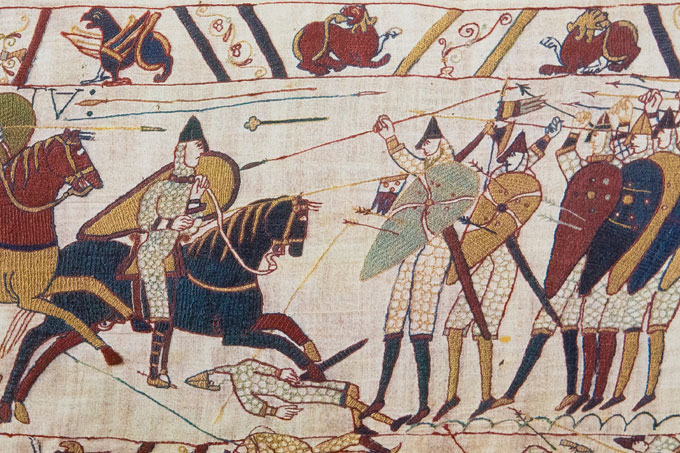Dr Leonie Hicks, Senior Lecturer in the School of Humanities, argues for a different way to study the battle.
October sees the 950th anniversary of the Battle of Hastings, one of Britain’s and the south east’s most important historical battles.
Nearly as much ink has been spilled, as blood was on the field itself in attempts to analyse and describe what happened on 14 October 1066, when William of Normandy killed King Harold and took the English crown.
Hastings was a significant and unusual event. Pitched battles were rare in the eleventh century and the conclusion saw the replacement of an entire ruling class. Therefore, it is unsurprising that historians have scoured the accounts of the battle in order to reconstruct the tactics used by the two armies and the events of the day. Virtually all text books and school teachings include a description that tries to reconcile the different accounts written by English and Norman chroniclers to get to the truth of what actually happened.
But the focus of historians throughout the years has been to try and answer the question: what actually happened? This approach is, in fact, the wrong way to understand the battle and its importance.
Unlike with some historical events, there are no surviving eye witness accounts, only echoes in other sources. In understanding Hastings, we actually need to ask: what do we know and what does that tell us about the way we understand the battle?
The one thing all the medieval writers agree on is that Harold was killed. This was the key moment on which the outcome of the battle was determined and with it the fate of the kingdom. Many of the questions posed about Hastings such as the number of times the Normans pretended to run away to lure the English from their defensible position or how Harold died are unknowable.
Medieval warfare was as confusing and bloody as anything in modern history and armies did not have embedded reporters who issued regular bulletins on campaign.
So, instead of reading the accounts of Hastings literally and putting together a chronological timeline, we need to think instead about what they reveal about the way medieval writers understood their world, the place of the Normans in it, and how the undoubtedly traumatic events of 1066 were understood in later generations.
Dr Leonie Hicks will be giving an open lecture, Reading and writing the Battle of Hastings, 1066, on Wednesday 19 October 2016 6pm, Old Sessions House, Canterbury Christ Church University, North Holmes, Canterbury CT1 1QU.
The lecture is free and open to all but we would advise to make reservations. To find out more about the lecture or to make reservations visit: www.canterbury.ac.uk/arts-and-culture or call the box office on 01227 782994.
 Expert comment
Expert comment Jeanette Earl
Jeanette Earl 1463
1463


